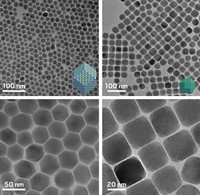Advertisement
Grab your lab coat. Let's get started
Welcome!
Welcome!
Create an account below to get 6 C&EN articles per month, receive newsletters and more - all free.
It seems this is your first time logging in online. Please enter the following information to continue.
As an ACS member you automatically get access to this site. All we need is few more details to create your reading experience.
Not you? Sign in with a different account.
Not you? Sign in with a different account.
ERROR 1
ERROR 1
ERROR 2
ERROR 2
ERROR 2
ERROR 2
ERROR 2
Password and Confirm password must match.
If you have an ACS member number, please enter it here so we can link this account to your membership. (optional)
ERROR 2
ACS values your privacy. By submitting your information, you are gaining access to C&EN and subscribing to our weekly newsletter. We use the information you provide to make your reading experience better, and we will never sell your data to third party members.
Synthesis
A Better Perylene Suncatcher
Solar Cells: Beefed-up molecule sets a new power conversion efficiency record for a metal-free dye
by Stephen K. Ritter
March 23, 2015
| A version of this story appeared in
Volume 93, Issue 12
Researchers in China have decorated the polycyclic aromatic hydrocarbon perylene with auxiliary groups to create the most efficient metal-free light-harvesting molecule reported to date for making dye-sensitized solar cells (J. Am. Chem. Soc. 2015, DOI: 10.1021/jacs.5b01537). Perylene derivatives have been used extensively as photocatalysts and in organic light-emitting diodes, but they have not been very competitive against ruthenium and zinc organometallic complexes when it comes to solar cells. Perylene does hold an advantage in being less expensive than the metal complexes, and therefore researchers have been tweaking the molecule to improve its efficiency. Peng Wang of Changchun Institute of Applied Chemistry of the Chinese Academy of Sciences and coworkers tailored their N-annulated indenoperylene (red) with an ethynylbenzothiadiazolylbenzoic acid group (black) from scratch by using a combination of alkylation, cross-coupling, and other steps. Through a series of electrochemical and spectroscopy tests, the team determined that the new dye achieves a power conversion efficiency of 12.5%, which is on par with the best metal complexes. Both metal-containing and metal-free organic dyes are now being challenged by upstart perovskite light-harvesting materials.






Join the conversation
Contact the reporter
Submit a Letter to the Editor for publication
Engage with us on Twitter